How Do I Book a Horseback Safari?
There’s something deeply stirring about galloping across the African plains, with the wind in your hair and herds of zebra and giraffe just ahead. Unlike the traditional game drives, a horseback safari brings you closer physically and spiritually to the wild. It’s not just an adventure; it’s an experience of presence, a conversation with nature where you’re no longer just an observer but part of the landscape itself. If the thought of exploring Africa on horseback sets your heart racing, you’re not alone. Many are discovering this unique and exhilarating way to connect with the wilderness.
But how exactly do you book a horseback safari? What do you need to know? Here’s everything you need to turn that dream into a reality, step by step.
1. Choose Your Destination Wisely
Horseback safaris are offered in select parts of Africa, each with its unique scenery, wildlife, and riding style. Your first decision is choosing where to go. Some of the top destinations include:
Kenya
Known for its wide open savannahs and iconic wildlife, Kenya is a prime location for horseback safaris. The Masai Mara is especially popular for those seeking to ride alongside wildebeest during the Great Migration.
Botswana
In the Okavango Delta, riders traverse flooded grasslands and remote islands. The experience is serene and rich in wildlife, including elephants, hippos, and a variety of birds.
South Africa
South Africa offers a more varied range of horseback safaris, from luxury experiences to more accessible rides. It’s a great place for first-timers or those looking for shorter, more manageable safaris.
Tanzania
While lesser-known for horseback safaris, Tanzania offers some spectacular private conservancies where riders can spot giraffes, zebras, and sometimes even big cats in remote, untouched areas.
When choosing your destination, consider the landscape, the types of animals you want to see, and the riding style that appeals to you most. Also, check the seasonal weather and wildlife patterns to time your visit perfectly.
2. Assess Your Riding Experience
One of the most important things to know before booking is that horseback safaris vary widely in terms of skill level. Some rides are gentle and suited for beginners, while others require advanced riding skills, especially those that involve galloping near wild animals.
Most operators will ask you to complete a riding experience form before confirming your booking. Be honest about your skill level. This ensures your safety and helps match you with the right horse and group. Even if you’re not a seasoned rider, there are safaris tailored for beginners, especially in South Africa.
3. Decide on the Type of Safari
Horseback safaris come in various formats. Here’s what you’ll need to consider:
Lodge-based vs. Mobile Safaris
Lodge-based safaris have you returning to the same accommodation each night. They’re more comfortable and often luxurious. Mobile safaris, on the other hand, move from one camp to another. These are more adventurous and allow you to explore larger areas.
Length of Safari
You can book anything from a half-day ride to a week-long expedition. If it’s your first time, a shorter safari may be the best way to ease into the experience. However, longer safaris offer a deeper connection with the landscape and more chances for wildlife encounters.
Group or Private Safaris
Most safaris are conducted in small groups, but some companies offer private experiences, ideal for couples or families.
4. Choose a Reputable Operator
This is one of the most important steps. A good operator can make the difference between an unforgettable journey and a disappointing one. Look for companies with experienced guides, well-cared-for horses, and excellent guest reviews.
Start by searching for horseback safari operators in your chosen destination. Websites like SafariBookings, TripAdvisor, and even Google Reviews are good places to start. Look for consistent positive feedback, and ensure that the company adheres to high standards of safety, animal welfare, and conservation.
Don’t hesitate to contact them directly. Ask about their guides’ qualifications, how they care for their horses, and what safety measures are in place. A good operator will be transparent and enthusiastic to help you plan your journey.
5. Book in Advance
Horseback safaris are not as common as vehicle-based ones and often cater to small groups. This means availability can be limited, especially during peak seasons. Once you’ve chosen your operator and dates, book as early as possible. Some safaris fill up six months to a year in advance.
When booking, you’ll typically need to pay a deposit, with the balance due closer to your travel date. Make sure to read the terms and conditions, including cancellation and refund policies.
6. Prepare for the Experience
Once your safari is booked, it’s time to prepare. Here are some essentials:
Insurance
Travel insurance is a must. Make sure it covers horse riding and remote medical evacuation.
Fitness and Training
Even experienced riders benefit from getting in shape before a safari. Riding for hours a day in the African heat can be physically demanding. If you haven’t ridden in a while, consider taking a few lessons beforehand to build your stamina and confidence.
What to Pack
Your operator will usually provide a packing list, but essentials include:
Riding helmet (some lodges provide them)
Comfortable riding boots
Lightweight, breathable clothing
Sun protection (hat, sunscreen, sunglasses)
Refillable water bottle
Personal first aid kit
Insect repellent
Avoid bright colors, and opt for neutral tones that blend with the bush.
7. Embrace the Adventure
Once you’re in the saddle, let go. Let the rhythm of your horse carry you into a space where the wild breathes around you. Trust your guide, trust your horse, and open your heart to the land. You might find yourself riding quietly beside a browsing elephant, galloping with zebras across an open plain, or watching the sun rise from a misty riverbed.
Every horseback safari is different, every moment unpredictable. That’s what makes it so magical. You’re no longer separated by the frame of a vehicle. You’re part of the environment seen, heard, and sometimes even smelled by the wildlife around you.
8. After Your Safari: Reflect and Share
When it’s all over, take time to reflect on the experience. Horseback safaris tend to be deeply personal. Write about it, talk about it, share your photos and stories. Not only will this help preserve your memories, but it may also inspire someone else to discover this incredible way of exploring Africa.
If you loved your experience, leave a review for your safari operator. Responsible travel relies on word of mouth, and your feedback helps future travelers make informed decisions.
Final Thoughts
Booking a horseback safari is more than just planning a holiday it’s saying yes to an experience that challenges, nourishes, and transforms. It’s a return to something elemental, where you move through the world not as a visitor in a glass box, but as a rider, a wanderer, a witness to the wild.
From the moment you choose your destination to the last canter through golden grass, the process of booking and experiencing a horseback safari is a journey in itself. If your spirit craves adventure and your heart longs for connection with nature, this could be one of the most rewarding decisions you’ll ever make.





